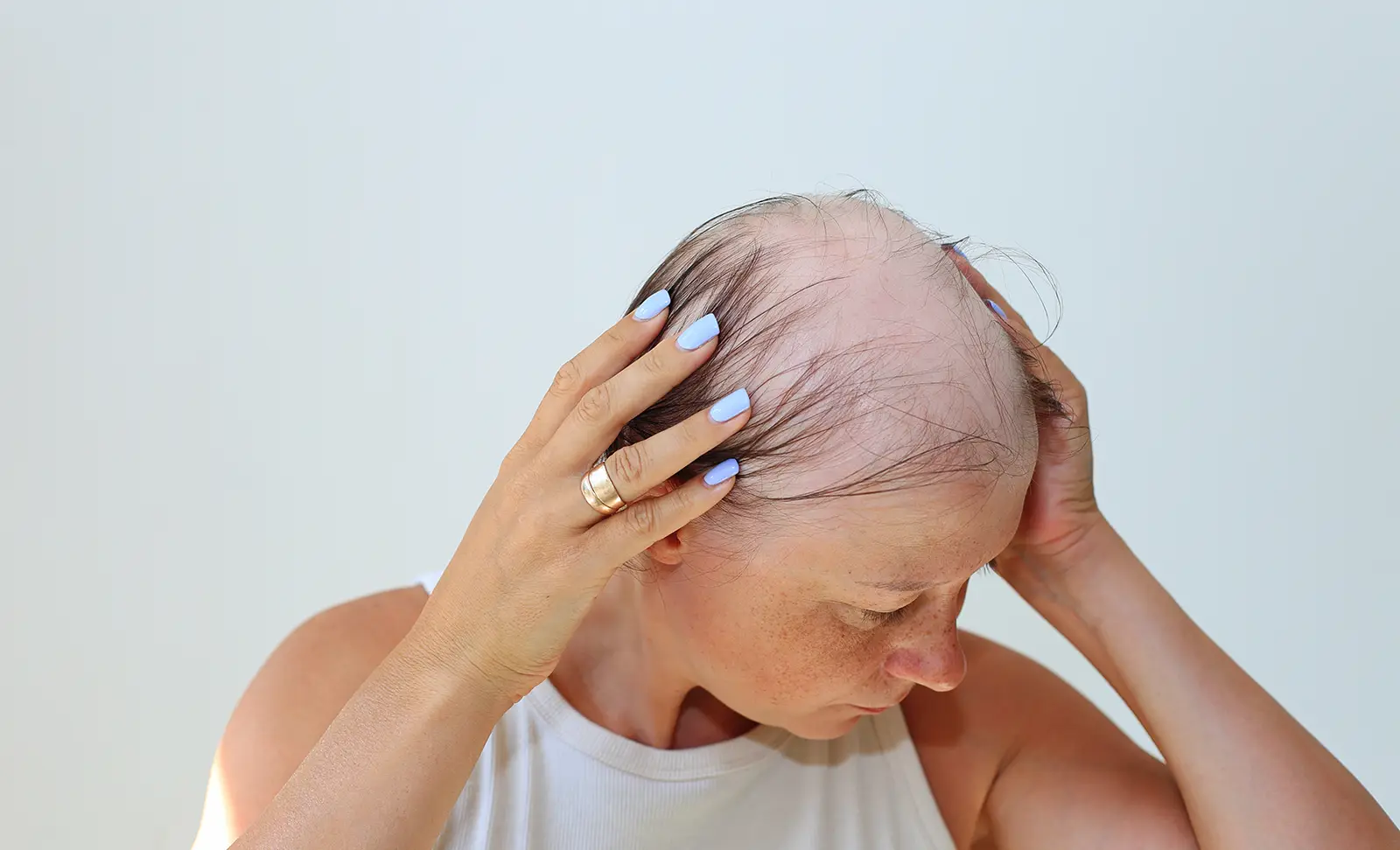Alopecia is an overall term for any hair loss on the body. There are many different types of alopecia; androgenetic alopecia is the most common, affecting most men and women at some point in their lives. Other types are less common. For example, alopecia areata only affects around 2% of people worldwide, according to the National Alopecia Areata Foundation. [1]
Any form of hair loss can be devastating. People often feel less attractive after experiencing hair loss, which reduces their confidence and sometimes affects their social and work lives. That’s why so many seek hair loss treatment options like Litfulo.
Litfulo is a very effective oral medicine for treating alopecia areata, providing many benefits to patients. However, some risks are also involved; the medicine isn’t for everyone. In this article, learn all you need to know about the advantages of Litfulo for alopecia and its potential side effects.
What is Litfulo?
Litfulo, also called ritlecitinib, is a prescriptive oral medicine that fights alopecia areata and helps patients grow back their hair. It’s quite a recent medicine, as it was approved by the Medicines and Healthcare Products Regulatory Agency in 2023 – but only for adults and adolescents 12 years and above. Patients take one single pill every day.
The medicine is one of the Janus Kinase JAK inhibitors, which are often used to treat immune system disorders like rheumatoid arthritis and alopecia areata.
How Litfulo Works for Alopecia
Litfulo is prescribed for patients with alopecia areata. These patients experience immune system attacks on their hair follicles, which leads to hair loss, often showing in patches around the scalp (and the rest of the body). Litfulo works as a JAK 3 and TEC inhibitor, preventing the signals that would otherwise attack the hair follicles and cause inflammation. This can lead to hair regrowth over time.
Several clinical trials have looked into the effectiveness of Litfulo for alopecia and shown extremely promising results. One double blind study [2] tested Litfulo on patients aged 12 and older over 24 weeks. Not only was the treatment well tolerated, but it also showed to be effective on many patients, helping them to regrow their hair over those weeks. Another study [3] showed that 24% of patients have 80 or more scalp hair coverage after six months of treatment.
The 5 Benefits of Using Litfulo for Alopecia
Are you interested in using Litfulo to treat your alopecia? Here are the benefits.
- It is Effective
Litfulo is genuinely effective. There have been multiple studies to test its effectiveness, and it has been approved by the Medicines and Healthcare Products Regulatory Agency. People genuinely experience fantastic results.
- It is Easy to Take
Litfulo is an oral medicine. This makes it easy for most patients to take, as it only requires swallowing one single pill every day. There’s no fuss with applying a hair care product.
- It is Supported by Regulatory Agencies
Unlike some other alopecia treatments, Litfulo is supported by several charities and regulatory agencies, including the Scottish Medicines Consortium, the Medicines and Healthcare Products Regulatory Agency, The National Institute for Health and Care Excellence (NICE) and Alopecia UK. This gives users peace of mind.
- It’s Available on the NHS
Litfulo is available on the NHS. In fact, it is the first-ever treatment on the NHS recommended to treat severe alopecia. This means patients can seek this treatment through their GP without paying high prices for the medicine.
- It Can Treat Severe Alopecia
Severe alopecia can be devastating. A solution like Litfulo provides hope, particularly because it can even treat the most serious cases of alopecia. Patients who have experienced large patches of hair loss all over their scalp (and the rest of their body) may find that Litfulo works to regrow all their hair, helping them feel more confident in their skin.
The Risks of Using Litfulo for Hair Loss
It’s crucial to highlight that Litfulo has some serious risks, which is why it’s heavily regulated. This is largely due to it being a JAK inhibitor, which can have some serious side effects in some people, including:
Decreased Red Blood Cell Count
Litfulo can decrease a person’s red blood cell count. That can be problematic, leading to other side effects such as vitamin deficiencies, bone marrow issues, and even chronic conditions.
Blood Clots
Blood clots are a serious condition that can lead to death. Litfulo increases the chance of deep vein thrombosis in the legs. That usually affects those who are over 50 years old and are already at risk of heart disease.
Infections
Litfulo impacts your immune system, which is responsible for fighting off infections. It can be an issue if you end up with an infection while taking Litfulo, as your body’s response may no longer be able to properly fight it off. Some serious infections you may be at risk of include Tuberculosis and herpes zoster. Specifically, the phosphokinase increase herpes zoster risks.
Increased Risk of Cancer
Litfulo can increase your risk of getting certain types of cancers, including lung cancer, lymphoma, and other skin cancers.
An Allergic Reaction
Some people are allergic to Litfulo, which can trigger a serious reaction that includes fast medical attention. Some symptoms of an allergic reaction include headache, diarrhea, acne rash, and urticaria. If you experience these, stop taking the medicine and contact your doctor immediately. If the symptoms are serious – for example, you have trouble breathing or a racing heart – seek emergency medical attention.
As you can see, Litfulo should not be taken on a whim – while there are amazing benefits for those with severe alopecia, the medicine also comes with significant risks.
Should You Take Litfulo? What to Consider
If you have experienced hair loss, you might wonder whether Litfulo is the right treatment. Here’s what to consider.
Your Age: Litfulo is only available for ages 12 and over – anyone younger cannot take this medicine.
Your Medical History: Certain conditions mean you cannot take Litfulo. For example, those with a low platelet count, serious infection, or liver problems will not have Litfulo prescribed to them.
Your Hair Loss: It’s typically not recommended for people with mild alopecia to take Litfulo due to the serious risks involved. If your hair loss is minimal, another treatment may be better. However, if you’ve been suffering from severe alopecia that is impacting your life, Litfulo could be a suitable medicine.
What Your GP Says: Ultimately, it’s up to your general practitioner (or another specialised doctor) to decide whether or not Litfulo is right for you. They will likely perform physical examinations and consider your medical history before prescribing the treatment.
Other Hair Restoration Methods
Litfulo is not the only option for hair loss – other treatments can help significantly, including the ones listed here. It helps to use a hair track app while using a new hair restoration treatment to monitor the new growth and see what works.
Minoxidil: Minoxidil is a less-invasive medicine you can purchase over the counter. It is a topical treatment (although you can find it in oral form) that you must apply to the scalp once per day for results to continue. It’s frequently used by people with androgenetic alopecia.
Finasteride: Finasteride is an oral medication like Litfulo but works very differently. It’s usually prescribed to treat prostate issues, but its ability to block the DHT hormone means it’s also effective when treating male pattern baldness. It requires a prescription.
Low-Level Laser Therapy: Low-level laser therapy is a simple treatment that involves directing red infrared lights at the scalp to stimulate hair growth. It works by boosting blood flow to the scalp. You can find devices that allow you to perform this no-pain treatment at home, although many clinics also offer it.
PRP Injections: PRP (platelet-rich plasma) injections involve taking your blood and then reinjecting it into the area experiencing hair loss. It works well thanks to the concentrated growth factors within the plasma, which can activate dormant hair follicles and boost growth.
Hair Transplant: Hair transplants are extremely effective solutions for hair loss, particularly for androgenetic alopecia. It’s a surgery that involves grafting hairs from one area of the scalp and transplanting them into another section. These hairs then take root and begin growing hair in the new area, leading to hair growth all over the scalp. The FUE method is particularly effective as it involves harvesting individual follicles for natural results.
Final Thoughts
Litfulo is not a medicine for any person experiencing hair loss. Instead, it’s a prescriptive treatment specifically for people with severe alopecia areata, and, for them, it can be extremely effective and help them regrow their hair and restore their confidence. If you have alopecia areata, it’s definitely worth speaking to your GP about this treatment.
Looking for other hair restoration options? At Harley Street Hair Clinic, we specialise in FUE hair transplants, giving patients the chance to enjoy a full head of healthy hair once more. Get in touch or check out our patients gallery to learn more about what we do.
Sources:
- https://www.naaf.org/alopecia-areata/#:~:text=Alopecia%20areata%20is%20a%20surprisingly,people%20in%20the%20U.S.%20alone.
- https://www.thelancet.com/journals/lancet/article/PIIS0140-6736(23)00222-2/abstract
- https://www.pfizer.com/news/press-release/press-release-detail/fda-approves-pfizers-litfulotm-ritlecitinib-adults-and




